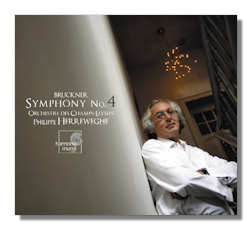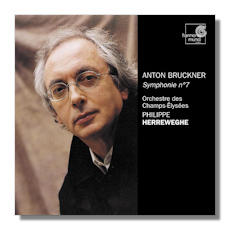
The Internet's Premier Classical Music Source
Related Links
- Bruckner Reviews
- Latest Reviews
- More Reviews
-
By Composer
-
Collections
DVD & Blu-ray
Books
Concert Reviews
Articles/Interviews
Software
Audio
Search Amazon
Recommended Links
Site News
 SACD Review
SACD Review
Anton Bruckner

Symphony #4
Orchestre des Champs Elysées/Philippe Herreweghe
Harmonia Mundi HMC901921


Symphony #5
Orchestre des Champs Elysées/Philippe Herreweghe
Harmonia Mundi HMC902011
Philippe Herreweghe's Harmonia Mundi recordings of Bruckner's 4th, 5th, and 7th symphonies with the Orchestre des Champs Elysées have met a mixed reception. Some reviewers have been downright hostile – e.g. this review of the 4th by David Hurwitz. I have a much more positive response. There are real benefits to listening to Bruckner's symphonies played by a smaller orchestra – as Herreweghe points out in the booklet accompanying the 7th, the balance of his forces is pretty close to that of the Leipzig Gewandhaus in the 1880s. And the use of period instruments and gut strings adds new timbres and sonorities. He is not a purist about editions, but does leave out the cymbal clash in the Adagio on the 7th (which makes good sense in the context of his overall approach – although including it works well for many other conductors).
The real strengths of Herreweghe's approach are, first, how the smaller orchestra allows the finer details of Bruckner's orchestration to emerge and, second, his grasp of the verticality of Bruckner's scores. On this second point, and as one might expect from a conductor so steeped in Bach, Herreweghe does wonderful job with the heavily contrapuntal 5th (particularly the fugue and double fugue in the final movement). He typically adopts fairly constant tempi. This generally works well, although the slow movement of the 5th has its longeurs and the overall architecture of some of the longer movements occasionally gets blurred.
Herreweghe's Bruckner is much more the religious symphonist than the Romantic Wagner enthusiast. There is a good deal to be learnt from listening to him in this light. The most recent of these recordings was 2009. It's about time for an 8th and a 9th. And, for that matter, why not a 6th and a 3rd?
Copyright © 2012, José Luis Bermúdez






















